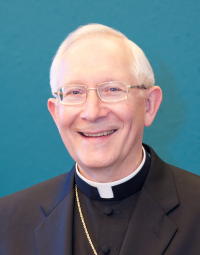
Archbishop Leonard P. Blair
When New York’s Cardinal Dolan was president of the U.S. Bishops’ Conference, in one of his annual addresses to the bishops, he said that many people in the Church today think of themselves as Christ’s sheep, but in a flock of just one — namely, themselves.
In an “I did it my way” world in which the maverick in- dividualist is idealized, and people claim the autonomy to define themselves, it’s no wonder that an increasing number of Catholics identify themselves as being Catholic but without attending Sunday Mass. Without realizing it they are a flock of one, as if that were possible, disconnected from the rest of the body of Christ in worship — and often in beliefs and moral teaching too.
Now that we are experiencing a pandemic, there are fears the “flock of one” phenomenon will get worse, that even more people will not return to Church when it’s over, but will think that watching a livestreamed or televised Mass by themselves in the comfort of their homes suffices, without encountering other people “live” and even without encountering Jesus “live” in the reception of holy Communion.
I, on the other hand, would like to think, and I hope and pray, that being deprived of church attendance and the sacraments during the pandemic will actually make people re-appreciate what they are missing. “Absence makes the heart grow fonder,” is the result I’m hoping for.
In a letter published in August, the Vatican issued a thought- ful reflection that calls us, as soon as circumstances permit, to “return to the Eucharist with a purified heart, with a renewed amazement, with an increased desire to meet the Lord, to be with him, to receive him and to bring him to our brothers and sisters with the witness of a life full of faith, love and hope.” The letter goes on to state:
“We cannot live, be Christians, fully realizing our humanity and the desires for good and happiness that dwell in our hearts without the Word of the Lord, which in the celebration of the liturgy takes shape and becomes a living word, spoken by God for those who today open their hearts to listen;
“We cannot live as Christians without participating in the Sacrifice of the Cross in which the Lord Jesus gives himself unreservedly to save, by his death, humanity which had died because of sin; the Redeemer associates humanity with himself and leads it back to the Father; in the embrace of the Crucified One all human suffering finds light and comfort;
“We cannot be without the banquet of the Eucharist, the table of the Lord to which we are invited as sons and daughters, brothers and sisters to receive the Risen Christ himself, present in body, blood, soul and divinity in that Bread of heaven which sustains us in the joys and labors of this earthly pilgrimage;
“We cannot be without the Christian community, the family of the Lord: we need to meet our brothers and sisters who share the sonship of God, the fraternity of Christ, the vocation and the search for holiness and the salvation of their souls in the rich diversity of ages, personal histories, charisms and vocations;
“We cannot be without the house of the Lord, which is our home, without the holy places where we were born to faith, where we discovered the provident presence of the Lord and discovered the merciful embrace that lifts up those who have fallen, where we consecrated our vocation to marriage or religious life, where we prayed and gave thanks, rejoiced and wept, where we entrusted to the Father our loved ones who had completed their earthly pilgrimage; and
“We cannot be without the Lord’s Day, without Sunday which gives light and meaning to the succession of days of work and to family and social responsibilities.”
It is my hope and prayer, as your archbishop, that we will take to heart these beautiful affirmations of our Catholic faith and make them our own! And that we will remember what our Lord said to the apostles when people walked away because he told them that without eating his body and drinking his blood they could not have life within them. “Will you go away too?” Jesus asked the Twelve. And Peter answered, “Lord, to whom shall we go? You have the words of eternal life.”
